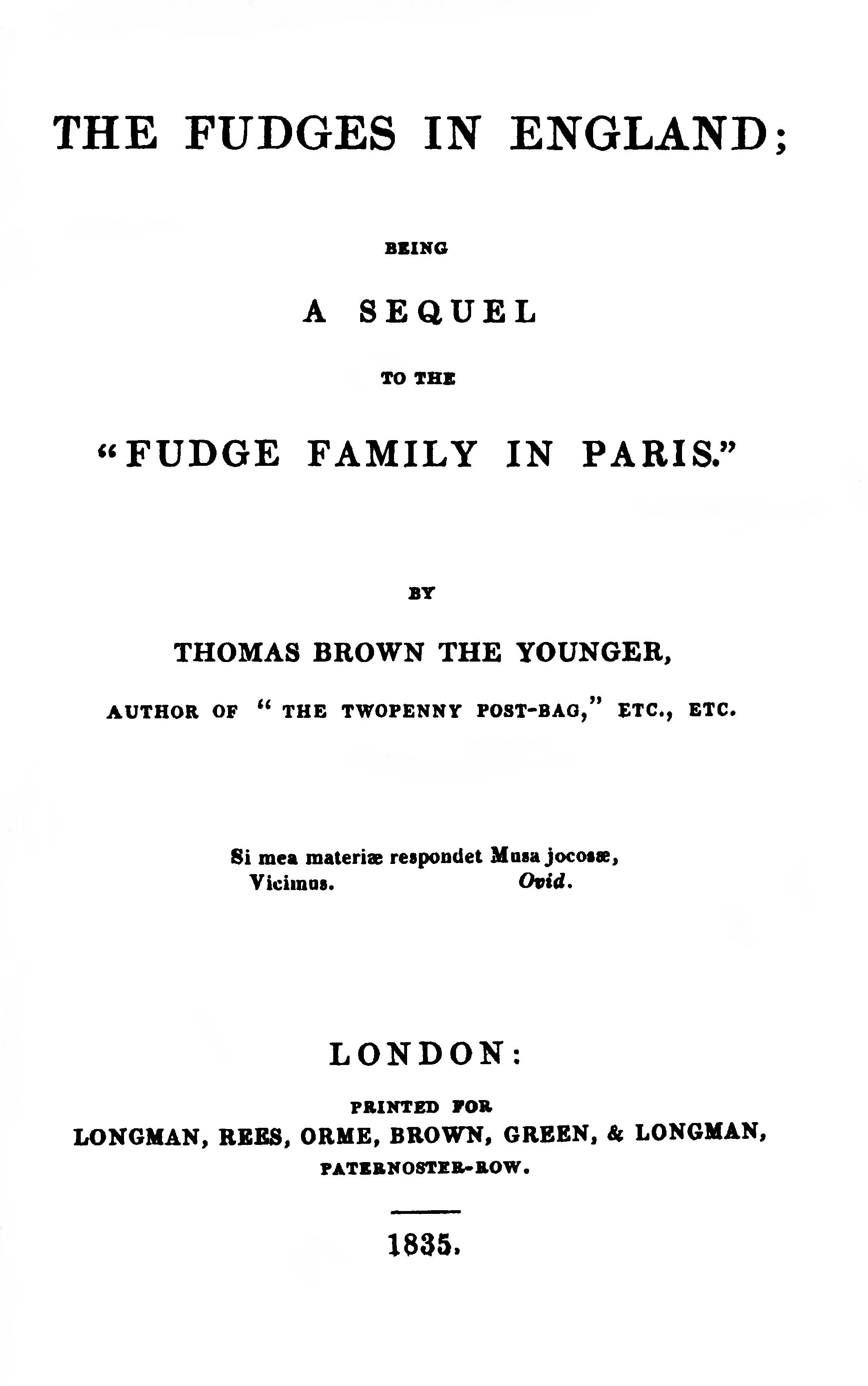The Fudges In England on:
[Wikipedia]
[Google]
[Amazon]
 ''The Fudges in England'' is an 1835 sequel to
''The Fudges in England'' is an 1835 sequel to
 ''The Fudges in England'' is an 1835 sequel to
''The Fudges in England'' is an 1835 sequel to Thomas Moore
Thomas Moore (28 May 1779 – 25 February 1852) was an Irish writer, poet, and lyricist celebrated for his ''Irish Melodies''. Their setting of English-language verse to old Irish tunes marked the transition in popular Irish culture from Irish ...
's 1818 work ''The Fudge Family in Paris
''The Fudge Family in Paris'' is an 1818 verse satire by Thomas Moore. It was intended to be a comedic critique of the post-war settlement of Europe following the Congress of Vienna and of the large number of British and Irish families who fl ...
,'' which had depicted the visit of the fictional British Fudge Family to Paris, where the daughter Biddy had fallen in love with a young man whom she had taken to be the King of Prussia but was in fact a draper. The original work was extremely popular and Moore had received requests to write a follow-up. He began working on ''The Fudge Family In Italy'', but abandoned it and it wasn't until seventeen years after the original that the sequel was released.
The sequel is set some years later, in a spa town likely to be Bath
Bath may refer to:
* Bathing, immersion in a fluid
** Bathtub, a large open container for water, in which a person may wash their body
** Public bathing, a public place where people bathe
* Thermae, ancient Roman public bathing facilities
Plac ...
, where the grown-up Biddy has travelled. Biddy has since become an evangelical Protestant, and because of the large inheritance she is expected to receive she is a target for fortune-hunting Irish suitors
Courtship is the period wherein some couples get to know each other prior to a possible marriage. Courtship traditionally may begin after a betrothal and may conclude with the celebration of marriage. A courtship may be an informal and private m ...
. One of these is a "Mick on the make", Patrick Magan, who secretly prefers Biddy's niece Fanny. Magan's attempts to woo Biddy are undermined by a rival, Mortimer O'Mulligan, who had converted from Catholicism to Protestantism in the hope of enriching himself. He marries Biddy while Magan elopes with Fanny. The story concludes with Biddy's rich uncle leaving his money to Fanny rather than Biddy, and O'Mulligan left penniless.
The work was less successful than Moore's earlier work and was not widely reviewed, probably due to a decline in Moore's popularity, although its critical reception was good. '' The Times'' wrote that Moore's observations were "as keen, and his satire as pungent, as ever". The work was the beginning of the end of Moore's writing career, and most of the rest of his work was on his unsuccessful four-volume ''History of Ireland''.
It is likely that the character of Mortimer O'Mulligan was based on the real-life Mortimer O'Sullivan who had been a fierce critic of Moore.Kelly p.517
References
Bibliography
* Kelly, Ronan. ''Bard of Erin: The Life of Thomas Moore''. Penguin Books, 2009. Novels by Thomas Moore 1835 British novels English novels Novels set in Somerset {{1830s-novel-stub